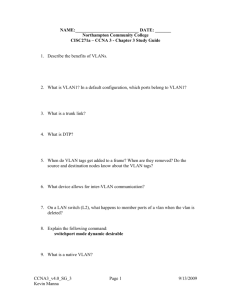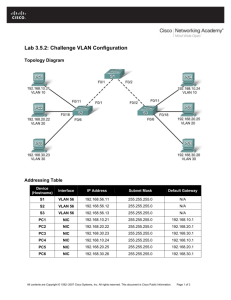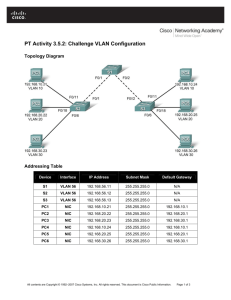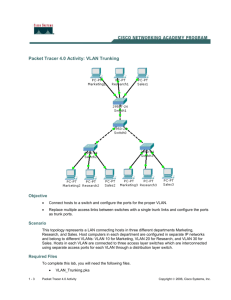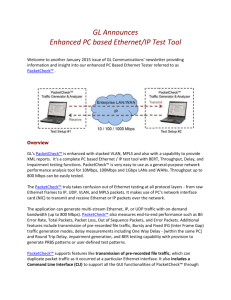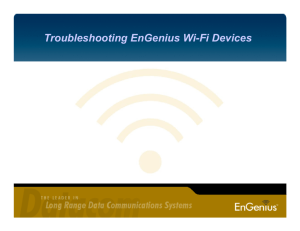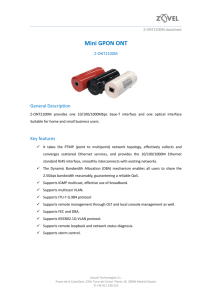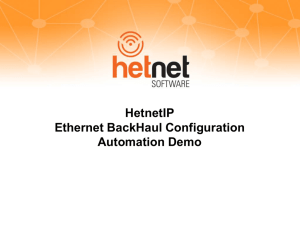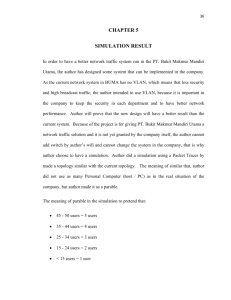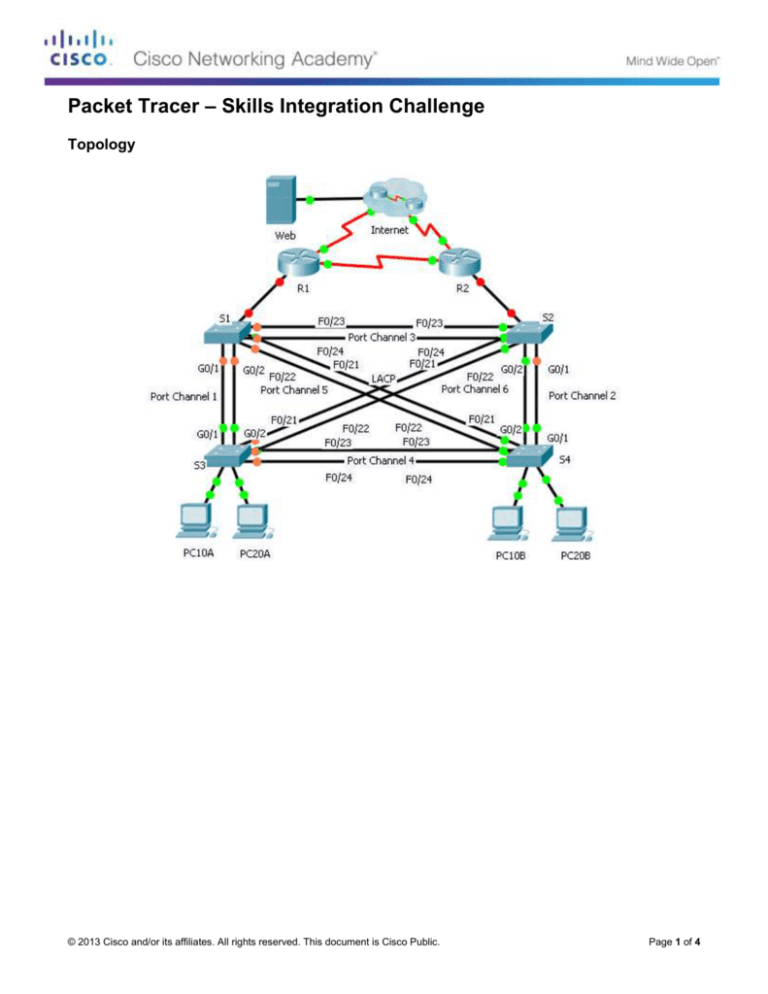
Packet Tracer – Skills Integration Challenge
Topology
© 2013 Cisco and/or its affiliates. All rights reserved. This document is Cisco Public.
Page 1 of 4
Packet Tracer – Skills Integration Challenge
Addressing Table
Device
Interface
IP Address
Subnet Mask
Default Gateway
VLAN Association
G0/0.1
192.168.99.1
255.255.255.0
N/A
VLAN 99
G0/0.10
192.168.10.1
255.255.255.0
N/A
VLAN 10
G0/0.20
192.168.20.1
255.255.255.0
N/A
VLAN 20
S0/0/0
209.165.22.222
255.255.255.224
N/A
N/A
S0/0/1
192.168.1.1
255.255.255.0
N/A
N/A
G0/0.1
192.168.99.2
255.255.255.0
N/A
VLAN 99
G0/0.10
192.168.10.2
255.255.255.0
N/A
VLAN 10
G0/0.20
192.168.20.2
255.255.255.0
N/A
VLAN 20
S0/0/0
192.168.1.2
255.255.255.0
N/A
N/A
S0/0/1
209.165.22.190
255.255.255.224
N/A
N/A
S0/0/0
209.165.22.193
255.255.255.224
N/A
N/A
S0/0/1
209.165.22.161
255.255.255.224
N/A
N/A
Web
NIC
64.104.13.130
255.255.255.252
64.104.13.129
N/A
PC10A
NIC
192.168.10.101
255.255.255.0
192.168.10.1
VLAN 10
PC10B
NIC
192.168.10.102
255.255.255.0
192.168.10.1
VLAN 10
PC20A
NIC
192.168.20.101
255.255.255.0
192.168.20.1
VLAN 20
PC20B
NIC
192.168.20.102
255.255.255.0
192.168.20.1
VLAN 20
R1
R2
ISP
Scenario
In this activity, two routers are configured to communicate with each other. You are responsible for
configuring subinterfaces to communicate with the switches. You will configure VLANs, trunking, and
EtherChannel with PVST. The Internet devices are all preconfigured.
Requirements
You are responsible for configuring routers R1 and R2 and switches S1, S2, S3, and S4.
Note: Packet Tracer does not allow assigning point values less than 1. Since this activity is checking 154
items, not all configurations are assigned a point value. Click Check Results > Assessment Items to verify
you correctly configured all 154 items.
Inter-VLAN Routing
On R1 and R2, enable and configure the subinterfaces with the following requirement:
- Configure the appropriate dot1Q encapsulation.
-
Configure VLAN 99 as the native VLAN.
-
Configure the IP address for the subinterface according to the Addressing Table.
© 2013 Cisco and/or its affiliates. All rights reserved. This document is Cisco Public.
Page 2 of 4
Packet Tracer – Skills Integration Challenge
Routing
Configure OSPFv2 using the following requirements:
- User process ID 1.
-
Advertise the network for each subinterface.
-
Disable OSPF updates for each subinterface.
VLANs
For all switches, create VLAN 10, 20, and 99.
Configure the following static ports for S1 and S2:
-
F0/1 – 9 as access ports in VLAN 10.
-
F0/10 – 19 as access ports in VLAN 20.
-
F0/20 – F24 and G0/1 – 1/2 as the native trunk for VLAN 99.
Configure the following static ports for S3 and S4:
-
F0/1 – 9 as access ports in VLAN 10.
-
F0/10 – 20 as access ports in VLAN 20.
-
F0/21 – F24 and G0/1 – 1/2 as the native trunk for VLAN 99.
EtherChannels
All EtherChannels are configured as LACP.
All EtherChannels are statically configured as the native trunk for VLAN 99.
Use the following table to configure the appropriate switch ports to form EtherChannels:
Port Channel
Device: Ports
Device: Ports
1
S1: G0/1 – 2
S3: G0/1 – 2
2
S2: G0/1 – 2
S4: G0/1 – 2
3
S1: F0/23 – 24
S2: F0/23 – 24
4
S3: F0/23 – 24
S4: F0/23 – 24
5
S1: F0/21 – 22
S4: F0/21 – 22
6
S2: F0/21 – 22
S3: F0/21 - 22
Spanning Tree
Configure per-VLAN rapid spanning tree mode for all switches.
Configure spanning tree priorities according to the table below:
Device
VLAN 10 Priority
VLAN 20 Priority
S1
4096
8192
S2
8192
4096
S3
32768
32768
S4
32768
32768
© 2013 Cisco and/or its affiliates. All rights reserved. This document is Cisco Public.
Page 3 of 4
Packet Tracer – Skills Integration Challenge
Connectivity
All PCs should be able to ping the Web and other PCs.
© 2013 Cisco and/or its affiliates. All rights reserved. This document is Cisco Public.
Page 4 of 4

